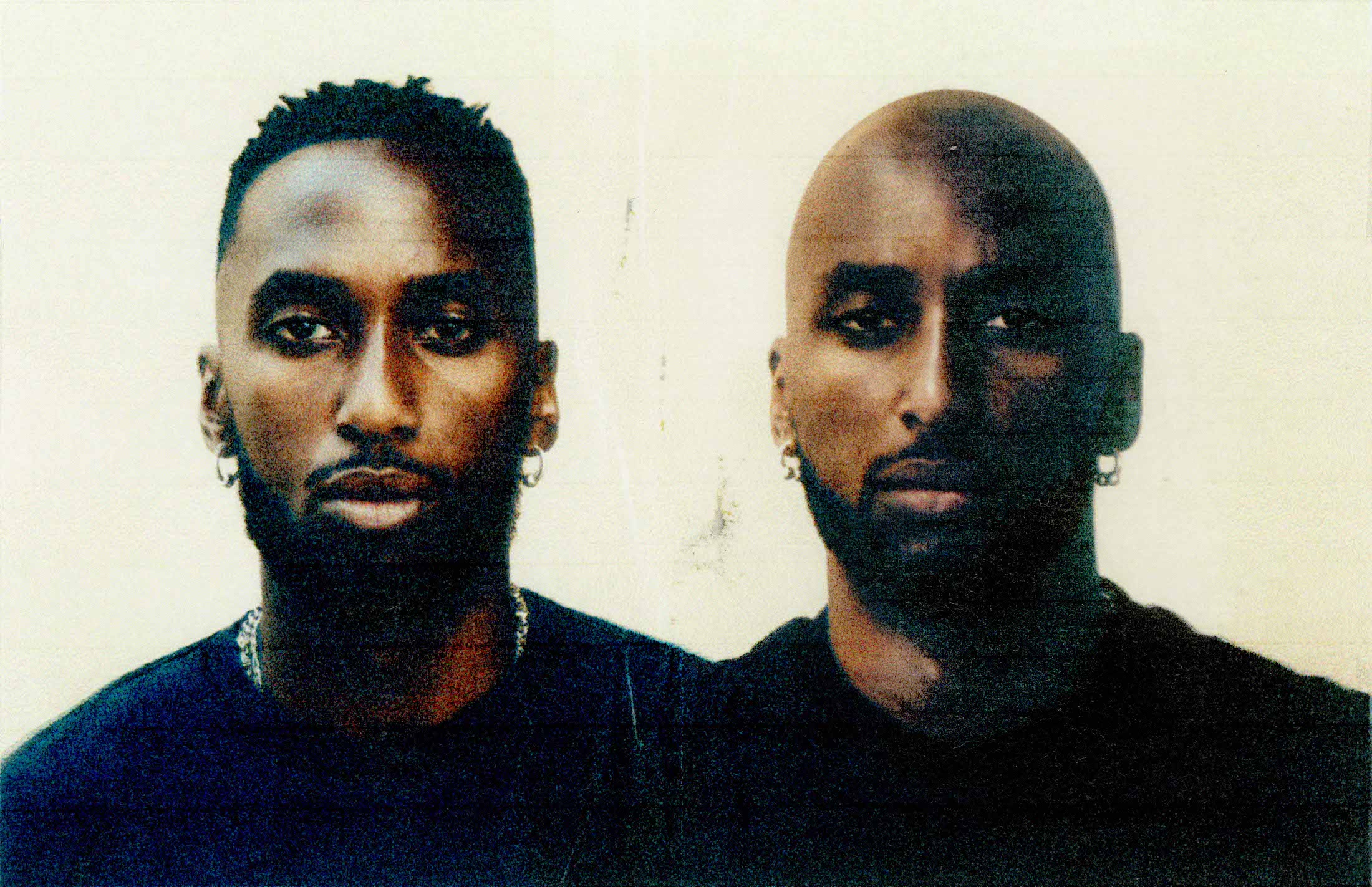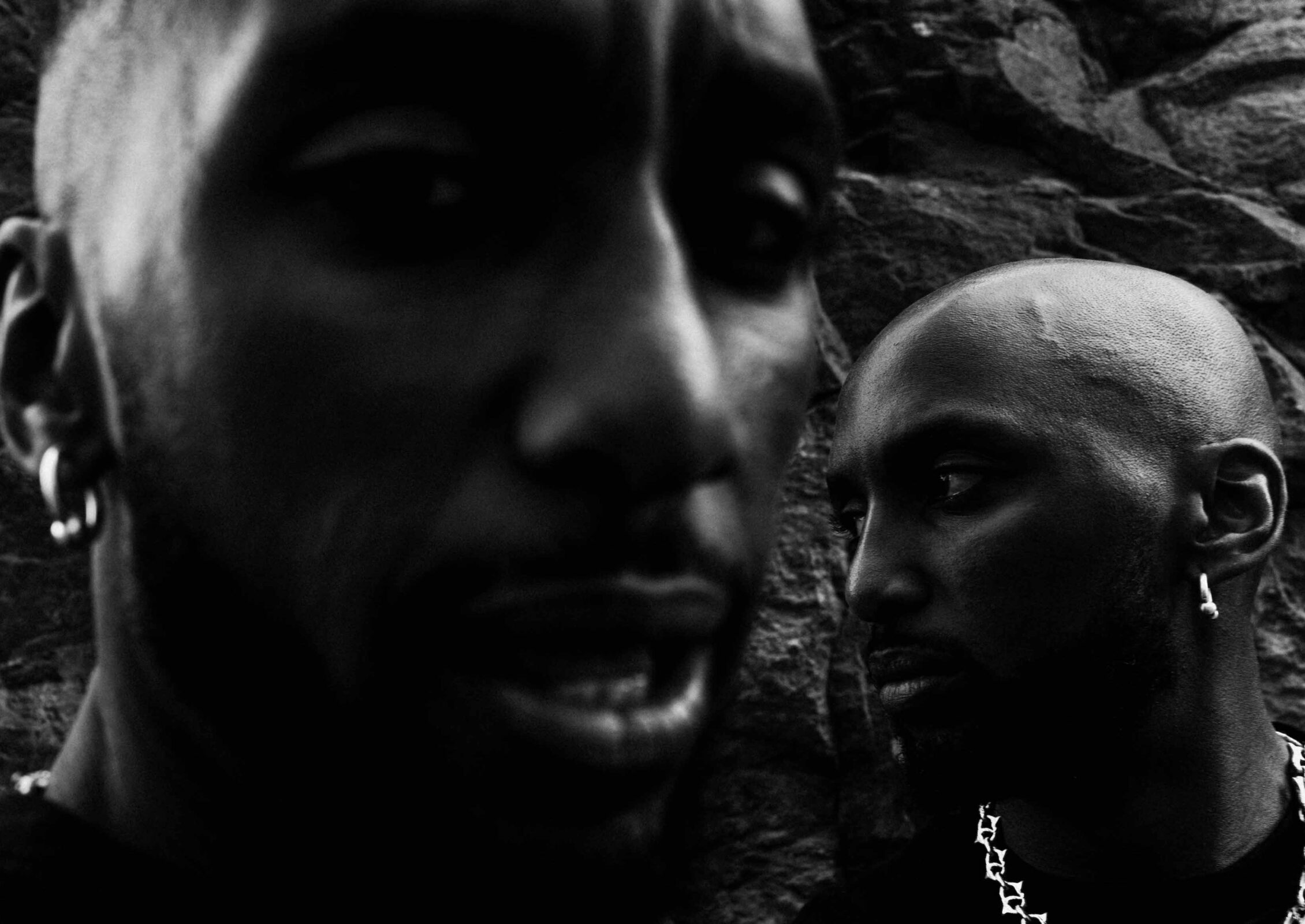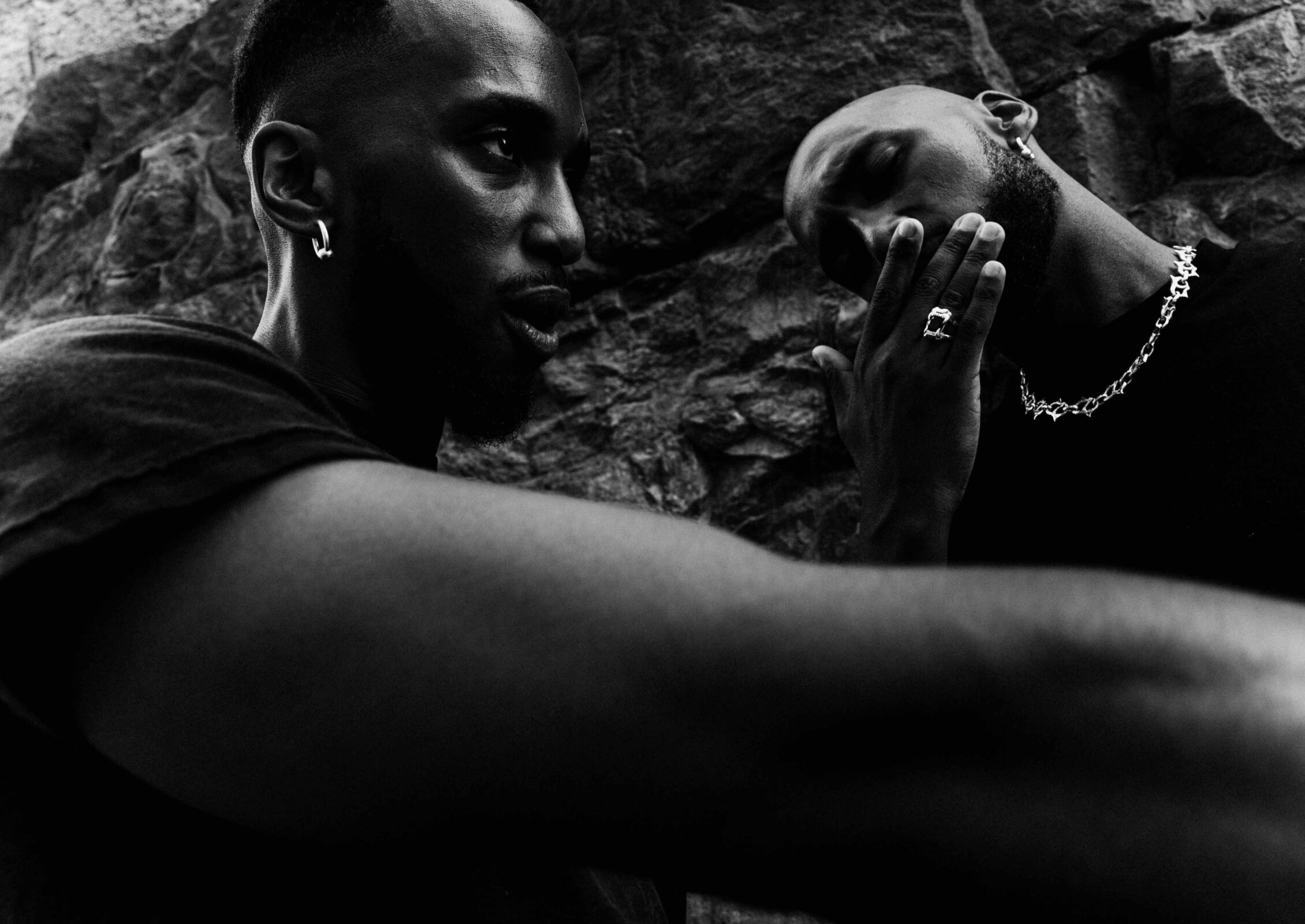- Words Jay Fullarton
- Photography Noah Agemo
The twin brothers behind genre-melting Swedish group Deki Alem discuss their debut album, Forget In Mass, performing at Glastonbury, and their relationship with grime.
“I feel good, actually, I’m looking forward to it,” says Sammy of Deki Alem, in response to whether they have any nerves before the release of their debut album, Forget In Mass. His brother Johnny nods in agreement. They seem quite collected about the significant release, and if you take time to listen to it, you’ll understand why they would be.
“Each song has its own feel to it. I’m excited for all our listeners to get it as soon as possible, man. I can’t wait.” Quality is always prioritised over quantity with these guys. The eight tracks pull no punches, and because everything here is just so propulsive, it leaves you wanting more – but that comes more from a place of greed than dissatisfaction.
The group is made up of twin brothers Sammy and Johnny Boakye Bennett, the kinetic voices you hear trading bars, and Richard Zastenker and Johannes Klahr, the alchemists working their magic behind the boards. They started out in Gothenburg on separate paths. Whilst the twins were chasing dreams of football, Richard and Johannes were sending each other beats on long-forgotten music forums. When the pandemic struck, they banded together and quickly incited a riot amongst Stockholm’s underground with a murky kaleidoscope of punk, hip-hop, and rave music. After two quickfire, incendiary EPs, a Swedish Grammy Award nomination, and two years of graft, their debut album Forget In Mass has finally arrived.
The record digs deep into the nuances of modern society whilst simultaneously capturing the golden era of every past influence proudly worn on its sleeve – whether that be moody Mezzanine-esque trip-hop on ‘Mr. Man’ or The Prodigy-adjacent hysteria on lead single ‘Fun’: a sweat-soaked floorfiller that strives to honour the “primal aspects of being a freak” with its contorted breakbeats and gravelly vocals.

Whilst these songs expertly pay homage to the music that raised them, they still feel entirely Deki Alem. They’re fine-tuned for claustrophobic crowds, and it’s apparent that live music is incredibly important to the group. They’ve spoken before about how their music needs to be felt as well as heard, and with tracks as visceral as ‘House Fire’, the group definitely harness the superpower of bringing both audiences and the hairs on your arm to attention.
“Music, for us, is something that brings people together in a physical sense, and in a day like this, when it’s leaning more towards the digital, it feels like there has to be this counter force”. The urgency of that counter force is crystal clear for every track on this punchy new record, and their desire to foster communities with dance and physical spaces feels more important to them than ever before. “We have to bring a little bit of that back, and it feels weird to say that.”
They’re due to embark on a Europe takeover later this year following their Glastonbury debut last month, which I got the opportunity to talk about with twins Sammy and Johnny. We also discuss their new album, trip-hop influences, and how it felt to open for Gorillaz.

You guys have always had short, punchy releases. Was it hard to trim the album down to just eight tracks?
Johnny: 10 is always like a nice round number that you aim for, I guess. But, we’re always trying to make songs that feel like us and that we feel can stand with time, you know. These eight tracks felt the most compelling to us.
What does the title Forget In Mass mean to you guys? Why was that title important for your debut project?
Johnny: So, Forget In Mass is a way of saying let’s escape this very dense information-heavy place that we’re in together and build a community where we can find joy in another way than just being bombarded by everything that life throws at us right now. So, it’s a little bit more of a statement that we want to carry with us, not only for the album, but for the artistry as a whole. We want people to belong and feel like they are part of something unique, special and intimate.
You really leaning into these ’90s trip-hop-esque sounds. Can you talk me through your relationship with that scene and how it came to influence the album?
Sammy: I was listening to a lot of Massive Attack, Portishead, Thievery Corporation, stuff like that. I’m heavy into that type of music. We grew up in the ’90s and watched a lot of MTV, and this shit got presented to us very organically. It connects with us in a way that modern music doesn’t, and that’s what I want to do with our music: we want to connect with people. For instance, I feel like ‘Mr. Man’ isn’t this single that hits you in the face and you get it instantly. It’s a grower and kind of a legacy song; I’m just happy to have a track like that in the catalogue because it’s timeless. I feel the same way about ’90s music.
‘House Fire’ has got this real sense of urgency, and I was wondering if this song was in protest of anything in particular, or if it’s just more about a general sense of unrest in society?
Johnny: It’s a little bit about oppression, and about when people are being contained and restrained and told that this is the way of life. There are consequences to containing too many people at the same time, so it’s a pledge for freedom in a way.
Sammy: When we play that type of rowdy song live, it connects with people in a certain way and gets people to release something. We like having those types of tracks where people get to be in a space together and just have fun.
‘Fun’ is fantastic. Tell me a bit about the creation of that song and why it felt right as the lead single.
Johnny: Nowadays, you get told a lot of stuff by people, and through your phone, on how to self-optimise and be the best possible version of yourself. This song is about putting all of that aside, becoming more of a primal creature and finding solace in that. The video also shows a maid trying to clean up this guest’s mess, until she gives in and becomes a part of the mess; it just feels like this album has that sentiment across the entire project.

I’m sure many people can’t wait to hear these new songs live. What can the uninitiated expect from this next tour?
Johnny: Energy, power and sweat. Sammy, do you want to add to that?
Sammy: It’s going to be a full-length show with all the tracks from the album. I feel like our catalogue has become better every year that passes by, so we’re excited to play it all. I feel like this music is going to resonate well in the UK, too. We haven’t been out there as much as we wanted to over the last couple of years, so I’m looking forward to connecting with our UK listeners.
Where is the best place you guys have performed outside of Sweden?
Sammy: I really enjoy Germany a lot. We were also in Romania to perform at Electric Castle, and the people over in Romania are fucking crazy. That took me by surprise.
Johnny: I remember a gig in Vienna last year, where we performed for around 300 people. It was packed, sold out, which was crazy! When you come to a city like Vienna and you see people singing along, it becomes very real. The music is resonating with people beyond the big metropolitan cities, so I really appreciate that.
How was performing at Glastonbury?
Johnny: We had two shows at Glastonbury, it was crazy. One at midnight, and one at 5 am – very different characters! The one at midnight was at the Shangri-La stage, and it was nice seeing the Glastonbury flags in the audience, stuff we’d only seen on the internet. Then we sat around for like three, four hours waiting for the other gig, had a quick power nap 15 minutes before the show, woke up and performed to a bunch of people on benders, you know? The sun was coming up; it was a dope experience.
I wanted to touch on the origins of Deki Alem. When did you guys decide that music was going to be a bigger focus than football?
Sammy: We’ve always been creative; we’ve always wanted to create something. Football can also be very creative, you know? But at 19 or 20, we realised that football wasn’t going to do it for us, and we started studying. Johnny went to study in London, and I went on to study in Malmö. Around that time, we started flickering around with music. I was learning to rhyme at my own pace, and I presented some ideas to Johnny, which led us to begin a career in Swedish hip-hop. When the pandemic hit, we started messing around with this idea of Deki Alem. One day I was like, ‘Yo, what do you think about this name?’, and Johnny was like, ‘Oof, it’s perfect. ’ From there, Johnny started fucking around with beats and samples, we ended up showing it to Richard, and he was like ‘Yo, this shit is weird, but I fucking love it’. We started working on what became our first EP, Among Heads, and from there, we just kept building.
Is it tough to work with someone you’re so close to? Are you ever having any brotherly, Gallagher-esque disagreements in the studio?
Johnny: Of course, we get into debates like brothers do, but what helps is that there are four of us creating music in the studio. Sometimes we still bump heads, but we’re great at communication, and me and Sammy have been making music together since 2016, so we’ve encountered every scenario you can think of.
You guys ended up being inspired by rappers like Tupac. What other stuff drove that passion for music when you were growing up?
Sammy: We’re heavy into hip-hop, everything like Cam’ron, Dipset, Jadakiss, Talib Kweli and Mos Def. I can go on about all the rappers that I’ve fucked with since I was a kid. I think it was the originality and the character behind each individual appearing on the TV screen that drew me in, and after that, I realised I loved the music as well. I actually started writing when I was like six, seven years old, but I was so ashamed that I took some scissors and cut it into pieces and flushed it down the toilet!
Johnny: You encrypted that piece of paper.
I’d love to know your thoughts on grime and UK rap. Are there any UK rappers you guys are excited about?
Johnny: We always loved grime since the early BBK days. Big fan of rappers like Skepta, JME, Giggs… I love the old school stuff. When we started with the Swedish stuff, we were very grime inspired. We started writing on grime type beats from YouTube for fun.
I wanted to briefly talk about some of your most renowned songs in your back catalogue. ‘Shadowman’ has grown to be one of your most popular tracks. Why do you think that one has resonated so much with people?
Sammy: We was talking about this literally yesterday, I think the hook is kind of contagious and animated, it’s abstract.
Johnny: There are a lot of elements from our tracks condensed down into one; you’ve got the raps, the melody, and this wonky beat. It’s also quite accessible in a way, even though it’s still very much our own.
Sammy: And we have a lot of fun in the studio making songs like that, I feel like it’s a party even when we’re making it, you know?
It’s a fantastic song, and I feel the same way about ‘Undercover Ecstasy’. That song feels gigantic, and I’d love to hear about the creation of it.
Sammy: Johnny, I remember you saying it was about one-night stands or something like that? All our songs come from very spontaneous ideas, and we like to have a lot of fun making music, so sometimes it can start from a very serious place and then end up a fucking joke, or the other way around. We also tend to think about how it will resonate and manifest live, and a song like ‘Undercover Ecstasy’ is very intimate, but also very big in its presence. It’s a song that lets us get under people’s skin.
I can hear a bit of early Gorillaz in a track like ‘The Big Boom’. Can you tell me about what it was like to open up for them?
Johnny: That was one of the biggest shows we had in the beginning. It was a really nice experience, not just opening up for them, but being able to spend some time behind the stage with Damon and the whole band, and just see the structure of doing it on that level. There were like 20 people, and it was interesting to hear about their touring experience firsthand. We’re very inspired by Gorillaz as well, the way they blend hip-hop with other genres, and how they’re so genre fluid. The world-building aspect is also one thing that captured me growing up, not just in the animated videos, but the music itself feels like a whole world, so they’ve been very foundational for my inspiration.
So, with all these experiences under your belt in such a short space of time, what’s next for Deki Alem?
Johnny: After the album, we’re going on our headline tour, with shows in the UK. Really looking forward to coming out and playing the new album; it will be our longest show yet.

